- Home
- Scott Kenemore
The Ultimate Book of Zombie Warfare and Survival
The Ultimate Book of Zombie Warfare and Survival Read online
Compilation copyright © 2015 by Scott Kenemore
The Zen of Zombie © 2007 by Scott Kenemore
Z.E.O © 2009 by Scott Kenemore
The Art of Zombie Warfare © 2010 by Scott Kenemore
The Code of the Zombie Pirate © 2010 by Scott Kenemore
Zombies vs. Nazis © 2011 by Scott Kenemore
The Zen of Zombie illustrations © 2007 by Adam Bozarth
Z.E.O. illustrations © 2009 by Adam Bozarth
The Art of Zombie Warfare illustrations © 2010 by Adam Wallenta
The Code of the Zombie Pirate illustrations © 2010 by Matt Meyer
Zombies vs. Nazis illustrations © 2011 by Adam Wallenta
All rights reserved. No part of this book may be reproduced in any manner without the express written consent of the publisher, except in the case of brief excerpts in critical reviews or articles. All inquiries should be addressed to Skyhorse Publishing, 307 West 36th Street, 11th Floor, New York, NY 10018.
Skyhorse Publishing books may be purchased in bulk at special discounts for sales promotion, corporate gifts, fund-raising, or educational purposes. Special editions can also be created to specifications. For details, contact the Special Sales Department, Skyhorse Publishing, 307 West 36th Street, 11th Floor, New York, NY 10018 or [email protected].
Skyhorse® and Skyhorse Publishing® are registered trademarks of Skyhorse Publishing, Inc.®, a Delaware corporation.
Visit our website at www.skyhorsepublishing.com.
10 9 8 7 6 5 4 3 2 1
Library of Congress Cataloging-in-Publication Data is available on file.
Cover design by Danielle Ceccolini
Cover illustration by Adam Wallenta
Print ISBN: 978-1-62914-483-2
Ebook ISBN: 978-1-63220-163-8
Printed in China
CONTENTS
Foreword from the Author
Introduction
Section 1: Leadership Lessons: Learn from the Enemy
Section 2: Inside the (Empty) Skull: How They Think
Section 3: Dead Lips Sink Ships: How They Communicate
Section 4: All’s Fair in Death and War: How to Fight
Section 5: Undead on Wall Street: Winning on the Corporate Battlefield
Section 6: So You’ve Been Bitten: Making the Most of Your New (Un)Life
Section 7: Zombie History
Foreword from the Author
Since the publication of the first book in this collection, great strides have been made in the advancement of the zombie. The undead are present in our lives as never before. From video games to books to films to television programs, they saturate our collective consciousness and shamble into our dreams. This is, of course, just as it should be.
At the time of this writing, Hollywood is filming its first $130 million zombie movie. The #1-rated new show on cable television is a zombie saga (based, itself, on a #1 graphic novel zombie saga). And the grandmaster himself, George Romero, has announced that he is back at work on another zombie film.
Yet for all this success and saturation, some still retain a profoundly shortsighted view of the undead.
Too many books, films, and games seek to portray zombies only as the enemy. The opponent. The other. These works meditate exclusively on the shortcomings and flaws of the walking dead. They hold zombies up as ready-made, obvious enemies, waiting to be killed (or at least avoided). In this fashion, zombies become over-simplified, throwaway villains. They get placed into video games and action movies as targets with little to do. No sooner are they presented to audiences, than they find themselves slaughtered or decapitated. They are cast off as pawns, not worth taking seriously. They end before they can begin, never examined or appreciated.
This is, of course, remarkably shortsighted.
The point of zombies is not to mow them down in waves. The point of zombies is not merely that they present an opportunity to try out your new Desert Eagle or laser-scoped M-16. Neither are they an invitation to revert to a primate state of violence, xenophobia, and hoarding canned goods on a remote mountaintop retreat.
They are so, so much more.
Zombies present a powerful new model for how we ourselves ought to be, and what we can accomplish if only we put our minds to it. Zombies have been sent here as messengers of enlightenment. They offer humans a chance to undergo a new and profound philosophical shift. They are beckoning, ready to take us to the next level of existence.
Zombies offer us all of this . . . and ask so very little in return.
Of course, most humans will prove too shortsighted to appreciate what has been placed before them. Only the especially astute and perceptive will grasp the lessons of the zombie. Only the most ambitious and driven will take the necessary steps to implement these lessons into their lives. This collection is designed for such people.
The benefits of pursing an existence modeled after the walking dead are difficult to overstate. The unflappable, brave, ever-stalwart zombie demonstrates a heroism that inspires us all. His lessons in “life” find applications across the spectrum. From family harmony to career advancement, from military dominance to existential enlightenment, the desiccated undead can reliably be your guide.
The zombie—who never doubts, never worries, and never feels insecure—is a sea of tranquility in a world filled with shaken souls who have lost faith in their own abilities. The zombie can show them how to restore that faith. The confused and lonely soul wonders what the purpose of his or her life can be. A zombie illustrates that a purpose can always be found, whatever the situation. Many people feel impotent and weak, unable to create real positive change in their lives. A zombie shows how to find an inner strength and make meaningful progress. The first book in this collection makes clear that the answers to your existential queries have an answer in the zombie.
The boardroom represents another great challenge in most of our lives. How does one get a job, keep a job, and make enough money to get by? Moreover, how does one crawl one’s way to the top of the corporate heap, and rule it? Zombies—innately expert in conquering and crawling to the top of heaps—have much to teach the aspiring CEO. The second book in this volume contains valuable undead insight for future corporate leaders.
A zombie’s might and majesty on the battlefield is likewise an inspiration to modern-day tactical commanders. Zombies raze country sides and penetrate impenetrable fortresses with alacrity and skill. No military force wants to face a zombie army, but any general who finds zombies in his command always counts himself lucky. The third book in this volume illustrates how zombie warfare can prove a valuable resource to soldiers and battlefield commanders alike.
Zombies are inextricably tied to the Caribbean. Any student of zombies seeking a tactile example of how zombies can show a path to success need look no further than zombies who ruled in piracy’s golden age. From the feared privateers who took down royal navies to the pirate kings and queens who enjoyed an autonomy and power that landlubbers could only envy, successful buccaneers harnessed the lessons of the zombie—as well as actual zombies—to take for themselves what the world was otherwise unwilling to give.
In the last century, zombies also played a crucial—though little known role in foiling Nazi Germany’s efforts to take over the world. As conflicts raged in Europe, the Nazi government dispatched a team of secret agents to infiltrate the Voodoo community on the island of Haiti and wrest from this religion’s adherents the secrets to zombie reanimation. The captured correspondence of these Nazi agents (included in this tome) paints a vivid picture of the devastating consequences awaiting those who oppose the walking dead, or
who attempt to pervert the inherent natural perfection that is the zombie.
The zombie has made a remarkable journey. When the first reanimated corpses crawled out of cemeteries on a small, impoverished island nation in the Caribbean, no one could have dreamed that they would come to saturate every aspect of our popular culture. They weren’t much to look at. They staggered about like drunken men. They were mostly unable to speak or read or perform mathematical calculations. They had numerous physical problems (including but not limited to missing eyes, skin, and entire limbs). Put these guys up against living humans—or, heck, even a group of smart monkeys—and they wouldn’t look like the horse you ought to be betting on.
But zombies are the smart bet. If anything’s clear, it’s that. Zombies are power. Zombies are effective. Zombies win. When a zombie outbreak occurs, the strongest countries are powerless to stop them. Militaries find that their massive stockpiles of laser-guided smart bombs and predator drones (designed, as they are, for enemies that will “die and stay dead”) fail time and again to make a dent in the hordes of approaching corpses. Governments—from egalitarian democracies to third-world banana republics—quickly slip into to anarchy as the zombies approach the capitol. Families and friendships are tested. Previously unthinkable actions become imminently thinkable (if not “Holy Jesus, the thing we have to do right fucking now!!! DO IT DO IT DO IT, before the zombies break through!!! DO IT NOW!!!”). Things as rock solid as marriages, religious convictions, and political orientations crumble to dust in the face of the oncoming hordes.
Zombies mean change. Zombies mean a new order. Zombies are catalysts.
They command attention wherever they go. When the living dead start to walk the earth, there is no other thing that people are talking about. Zombies, collectively, are the ultimate celebrity. They are the cast of the best reality show going, and their “antics” put peacocking weightlifters and dance contest winners to shame. When the dead crawl out of their graves and start eating people’s brains, they are the only thing that photojournalists want to take pictures of. Hollywood publicists wish they could get their clients the press that zombies get without even trying.
Do you want to be game-changing and famous? (Hint: All psychological and sociological research ever conducted says that you do.) Emulating a winner is the best way to become a winner, and you’re not going to find a bigger winner than zombies.
Do you seek autonomy? Independence? Freedom from a lousy boss or a family that never listens? Zombies are the key to your freedom. Nobody tells a zombie what to do. But more importantly, everybody knows it’s pointless to tell a zombie what to do. You might as well yell at a mountain, or craft a carefully-worded missive to a typhoon. Zombies are going to do what they’re going to do. Period. Would you like that kind of autonomy? Would you like to be your own boss (and never listen to anyone, ever, about anything)? Follow the example of a zombie, and your reputation as un-bossable will proceed you wherever you go.
Are you worried about money? I mean, let’s be real here. We’re living in the worst financial crisis since the Great Depression. (If you’re not worried about money, I’m worried about you. Seriously.) But it doesn’t have to be that way. Zombies don’t worry about money. Or credit scores. Or if the landlord will stop by and notice that all the copper wire has been stripped from the house. Zombies already have everything they need. They operate in a world outside of currency. With the exception of brains—for which, the hunger can never (and should never) be sated—zombies depend on nothing outside of themselves for status, success, or the ability to make things happen. If financial issues have been keeping you up at night, use the books in this collection to disperse your money fears like humans dispersing before hordes of the walking dead.
Is self-esteem an issue for you? Do you not look like the people you see on TV (except maybe the weight loss competitions or makeover programs)? Do you dream of a day when you’ll wake up in the morning and not worry about the judgmental stares from strangers waiting to find fault with you? Perhaps nothing in the arsenal of the zombie is more powerful than its ability to utterly obliterate any doubt, worry, or fear. All feelings of insecurity vanish before the undead. Zombies—who are frequently lacking important organs and body parts altogether—never suffer from self esteem issues. Zombies have never been made to feel bad about themselves. Though they frequently have not just one or two, but an entire host of physical maladies, zombies maintain an incredibly high opinions of themselves. They walk with a swagger (that may or may not be voluntary). They are immune to the judgments of others. They have no doubts and require no encouragement.
To be a zombie is to walk in power—unfettered and without fear. It is to answer to no one . . . and to feast upon everyone. These days, that’s rare.
Have no doubt about it, our world is in turmoil. There are unpredictable international forces acting on all of us—endangering our jobs, our communities, and our very lives. Military conflicts rage across the world. A global financial depression holds us in its merciless grip. People are not constantly talking about how awesome zombies are.
Clearly, the lessons of the walking dead have never before been more necessary.
In these times of difficulty, strife, and insecurity, the world craves self-assurance. It craves consistency. It craves confident people who know who they are and what they want.
In conclusion, zombies do not dominate our culture because humans need another villain to kill with machetes and machine guns. (There are ample enemies and threats to go around right now.) Rather, zombies are popular because humans know a good thing when they see it. Zombies are, in their way, perfectly suited to navigate difficult times. They are imperturbable as Zen masters. They are, verily, the last and best hope—for themselves, and maybe for us too.
Zombies are ready to give you their power. They stand before you—a somewhat motley crew, yes—but their offer is rock solid. They are prepared to welcome you into the fellowship. They are offering you strength, clarity, and effectiveness. They want to know if you are ready. Ready to lead. Ready to win, Ready to send your problems packing.
The zombie closest to you extends his moldy, rotting hand.
Will you take it?
Introduction
This book is about the imponderable (though nonetheless real) drive within you to slough off the charnel earth of the grave and stalk through ebon forests of the night under a gibbous moon to prey upon living flesh, even though no heart beats within your own chest. It is about the quest of the zombie—the netherworld’s most elegantly simple creation—and its unceasing hunger for the flesh of man.
Life’s gonna throw you some curveballs, and nobody knows this better than a zombie.
Zombie Tip—In some languages, the word for “crisis” is also the word for “ opportunity:” In the language of a zombie, however, the word for “crisis” is also the word for “a decided lack of yummy humans to eat.” (The zombie word for “opportunity” is likewise synonymous with “a school bus full of defenseless children,” “a group of overconfident, naïve explorers,” and “a crowded country house with the road washed out and the phone lines disconnected from a storm.” . . . but you probably could’ve guessed that.)
You may have to move far away from home to go to the college or university of your choice. Your company might downsize you around the holidays when you least expect it. Your desiccating corpse might be reanimated by an evil warlock’s spell, a secret government nerve agent, or radiation from a UFO.
Life’s going to throw stuff like this your way now and then. Need some advice on how to get through it? Look no further than our friend the zombie.
Zombies don’t ask “Why did this happen to me?” They don’t meditate on the meaning of their reanimation. Nope. It’s up out of the grave and right on the hunt for brains.
Zombies have a way of making the best of a situation.
Throw a zombie in the middle of the ocean, and hey, it’ll get back to land eventually. But in the meantime, it
’s going to fuck up some sharks, probably an octopus or two, and, damn-straight, any unlucky fisherman it gets its rotting hands on. Sure, one day its inherent drive to locate and consume thinking human brains will drive the zombie back to land—and yeah, it might be down to bone and rags by then, but that thought’s not stopping it for a second.
Freeze a zombie in an arctic ice floe. Sure, it’s trapped for the short term. The moment global warming reaches it, though—boing!—it springs up good as new, ready to mess you up.
Burn a zombie. Throw acid on a zombie. All I can say is that you better finish the job, because those sons of bitches will just keep on coming.
Cut off a zombie’s limbs (one by one, if you like) and it will continue to drag itself after you.
See, the zombie doesn’t draw the inference polite society might expect it to draw. It doesn’t think: “Gee, I’m on fire. I should really stop to put this out before continuing on my way.” It doesn’t think: “I have no arms and legs left, and inching myself along with my neck is really taking a while. Maybe I should just give up and let the other zombies have all the fun.” No! You’re not going to convince a zombie it’s time to give up and start pouting. It’s just not done. (Or not something done by zombies, anyway.) A zombie stops only when its own brain is destroyed or disconnected from the spinal cord. Only under similar circumstances should you consider giving up on yourself as an acceptable option.
Remember to think of the adaptable zombie when life throws you something you weren’t expecting. It doesn’t have to be a villager planting a flaming pitchfork in your chest, or a machine-gun assault by a top-secret federal anti-zombie agency. It can be an irritating foot fracture, being passed over for a promotion at work, or having your car repossessed. Sure, zombies don’t (usually) drive, but it isn’t difficult to guess what a zombie would do in that situation.
He’d shuffle right to the bus stop, and go to work all the same. And once at work, he would eat the head of his boss (despite an irritating foot fracture).

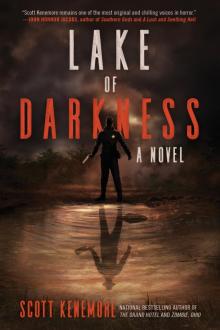 Lake of Darkness
Lake of Darkness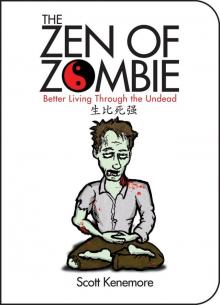 The Zen of Zombie
The Zen of Zombie Zen Of Zombie (Zen of Zombie Series)
Zen Of Zombie (Zen of Zombie Series)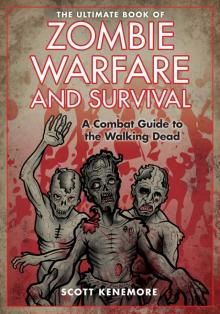 The Ultimate Book of Zombie Warfare and Survival
The Ultimate Book of Zombie Warfare and Survival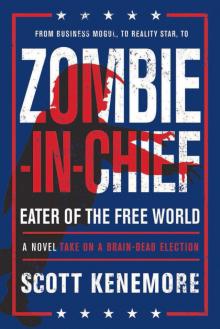 Zombie-in-Chief
Zombie-in-Chief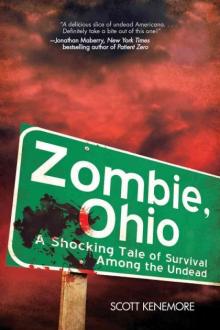 Zombie, Ohio
Zombie, Ohio Zombie, Illinois
Zombie, Illinois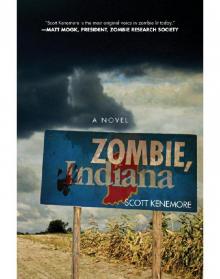 Zombie, Indiana
Zombie, Indiana